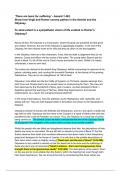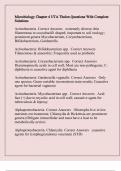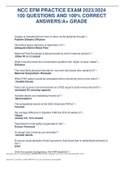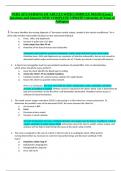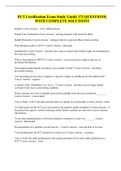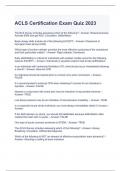‘There are tears for suffering’ - Aeneid 1.462.
Show how Virgil and Homer convey pathos in the Aeneid and the
Odyssey.
To what extent is a sympathetic vision of life evident in Homer’s
Odyssey?
Above all else, the Odyssey is a moral poem, where the guilty are punished and the good
are exulted. However, the end of the Odyssey is appealingly simplistic. In the end of the
Odyssey, the hero returns home to his wife and they lay down on the bed together.
In the Odyssey, there are a few characters, if any, that are dealt a judgement they do not
deserve. Cause and effect rule the events of the poem. The young sailor Elpenor got too
drunk in Book 10, fell off the roof at Circe’s house and broke his neck. Whilst it is indeed
unfortunate, it was his own fault.
The suitors are disloyal to the absent King Odysseus, wilfully consuming his reserves of his
palace, rebuking seers, and courting the sorrowful Penelope, at the dismay of the growing
Telemachus. They are in turn slaughtered, all 108 of them.
Odysseus’ crew killed and ate the Cattle of Hyperion on Thrinacia, despite warnings from
both Circe and Tiresias that to do so would mean no homecoming for them. The crew are
then destroyed by the thunderbolt of Zeus, god of Justice. As Zeus declared in Book 1,
Aegisthus ignored the warnings of Hermes, killed King Agammemnon and married
Clytemnestra. As a result, the avenging Orestes killed him.
In the song of Demodocus, Ares the adulterer courts Hephaestus’ wife, Aphrodite, and
sleeps with her. They are both trapped whilst in fornication and shown to the Olympians in
disgrace.
Odysseus endres his travels with fortitude and temperance, and is in turn given a restful old
age with his wife. Odysseus told his name to the Cyclops in a spark of Iliadic pride and was
punished by the curse of Poseidon as a result. Thus, the Odyssey is a moral tale of justice
being carried out. The scholar Jones declares correctly that the end of the Odyssey “would
be repugnant if the slaughter of the suitors were not seen to be morally justified”.
Whilst the people who are killed and slaughtered deserve their fate, the descriptions of their
deaths are never so one-sided. We are left with no doubts by the end of Book 21 that the
Suitors deserve their death and countless references have been made to their blasphemy,
greed and disrespect to the House of Laertes. It is only due to the potable descriptions of
their doom which make us slightly uneasy (“Dead men and the sea of blood” O.22.408).
Odysseus is very careful to remind us that this deed had to be done and the sufferings of
those who did it are not important (“Gloat in silence…their own transgressions have
brought them to his ignominious death” O.22.409). The descriptions of the sailors’ doom
on the sea are far more pitiable than the Suitors’ within the feasting hall, even though both
have been treacherous. We can account for this by remembering that these suitors are
, princes and young men who didn’t join the Trojan war. Thus, their descriptions of their
ignoble deaths amongst their gluttony are less evocative of pathos than the Ithacan veteran
sailors’ death, on the high seas.
However, having said that, Homer frequently shows those who are receiving their deserved
fate in a more positive light than we would expect. The monstrous Cyclops Polyphemus,
despite his horrific consumption of six members of Odysseus’ crew is pitiably depicted,
futilely trying to herd his flocks, attempting to help his animals though he was “tortured and
in terrible agony”. It pains him that his females are standing “bleating at the pens”
because they have not been milked. Odysseus’ crew, whilst frequently treacherous and
disloyal to their captain, are described with massive pathos when they are killed (“as
though they had been puppies” O.9.290). Similarly, Odysseus feels terrible pity for their
death at the hands of Scylla (“Shrieking…in their last desperate throes…never had to
witness a more pitiable sight than that” O.12.258) and at the hands of the Laestrygonians
(“the groans of dying men was appalling” O.10.123). This fantastic use of rhetoric as
Homer describes the gory sights of potable doom magnify the pity we feel for the crew, who
have fallen victim to misfortune and at other times, receiving the doom they have brought
upon themselves.
The pity evoked when the men are killed at the hands of monsters is natural repulsion at
their gory demise. The pathos Homer creates when we hear about the Suitors’ doom, the
Cyclops or the destruction of the Ithacans must not be mistaken for disapproval at their
judgement. It is normal to feel disgust for another person in torment and in their death
throes, nothing more. It is intended to evoke pity but not anger at their doom and does not
reflect upon those who inflicted the agonies. This is true in most cases. Odysseus’
destruction of the suitors had to be done. Zeus’ destruction of the Ithacan crew had to be
done. But the Laestrygonians, Scylla and the Cyclops are unfortunate mishaps, committed
by terrible monsters, with no piety or civility. The fact that they endured this torment does not
reflect on their leader, Odysseus - it was just ill luck along the voyage, which if anything, was
elongated by the crew themselves.
The literary techniques employed by Homer include the use of similes at moments of intense
drama. These include scenes of pathos and torment and help magnify the audience’s natural
pity by appealing to yet another kind of compassion we are prone to, usually our sympathy
for animals. For example, the Ithacan crew’s death at the hands of Polyphemus to helpless
“puppies”. However, unlike Virgil, Homer does not make any connection between the killer
and the victim. For example, between Antinous and Odysseus, in which the killer feels no
remorse as it had to be done.
Aeneid:
The Aeneid is a far more complex arrangement of characters, many of which perish for the
glory of Rome to be realised. The constant and unalterable question hanging in the
background throughout the poem is whether duty of honour overrides all this tragedy.

